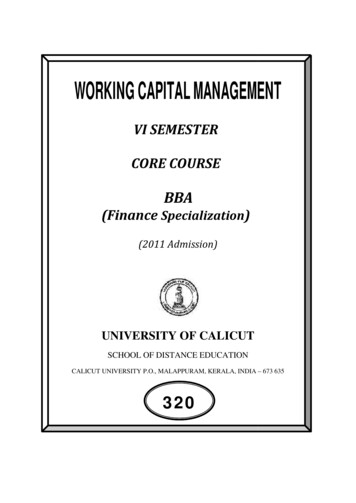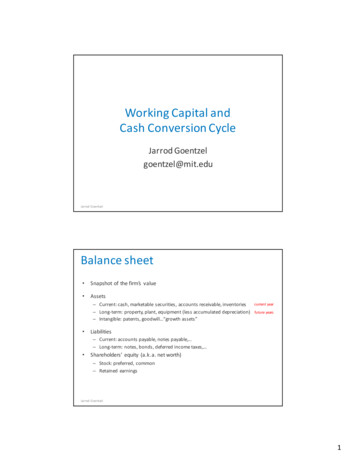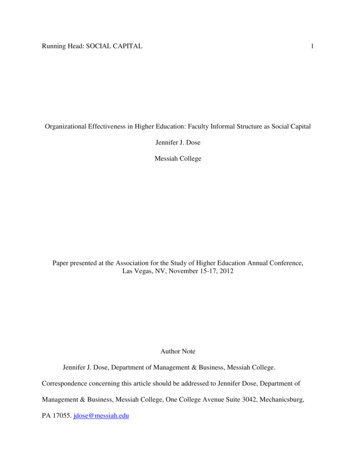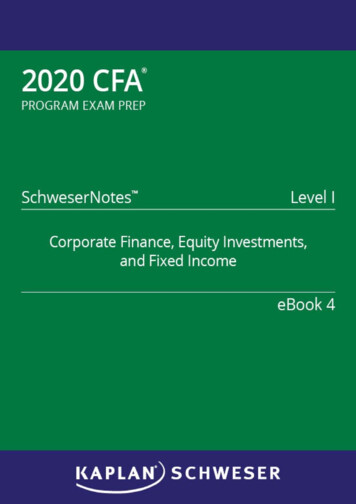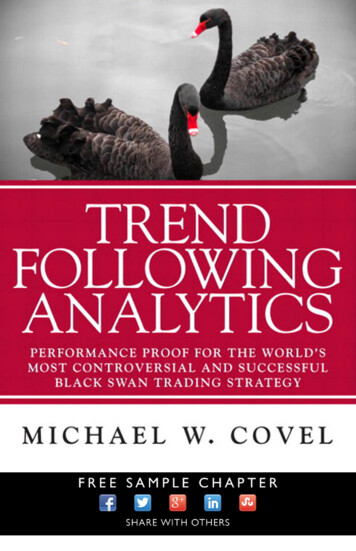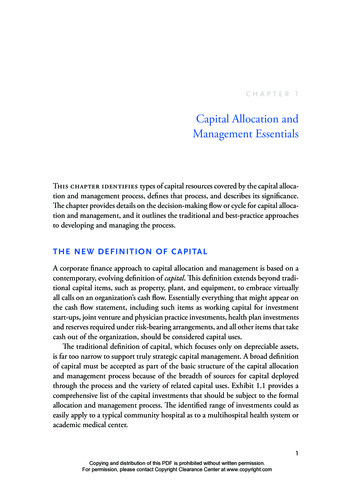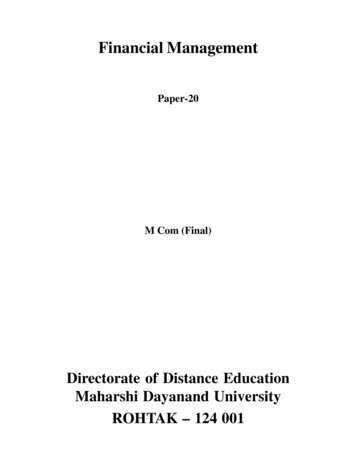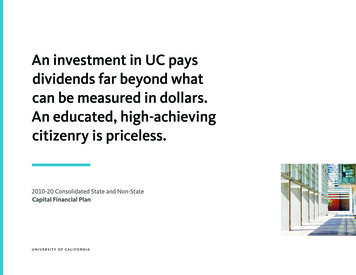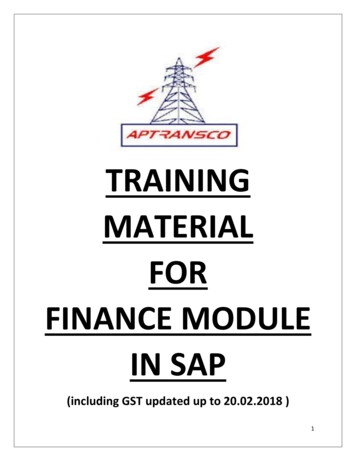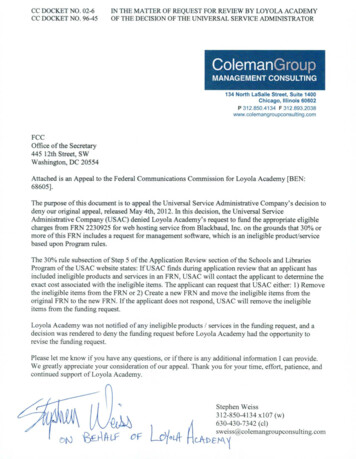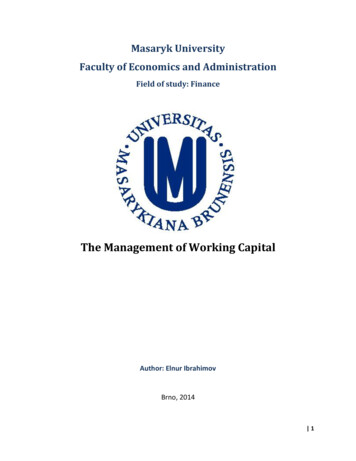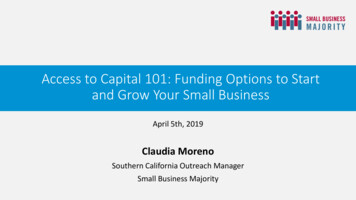
Transcription
Access to Capital 101: Funding Options to Startand Grow Your Small BusinessApril 5th, 2019Claudia MorenoSouthern California Outreach ManagerSmall Business Majority
About Small Business Majority Small business education and advocacy organization – foundedand run by small business owners. Been in business since 2005. National – 8 offices in Washington, D.C., California, Colorado,Illinois, Maryland, Missouri, and Virginia Focus on issues of top importance to small businesses ( 100employees) and the self-employed, including access to capital,healthcare, retirement, entrepreneurship, taxes and more; worksupported by extensive research Our Entrepreneurship Program brings resources and education tosmall business owners in key areas of running and growing a smallbusiness.
About Small Business Majority: Our Model
Activity: Quick Survey2 ways to join:1. Download the Kahoot App &Enter the pin to join2. Open www.kahoot.it & EnterGame PIN displayed
Topics of discussionBackground and research5 C’s of CreditKey questions to ask when seeking fundingThe funding landscape: Community development financial institutions (CDFIs)SBA-backed loansCommunity banks & credit unionsAlternative online lendersSmall Business Borrowers’ Bill of RightsResources and tools
Access to Capital 101The dilemmaOur scientific opinion polling:90% of small businesses say the availabilityof credit is a problem The availability of capital iscrucial for small businessstartup, survival, and growth. Only 18% of small businessesever access a bank loan. Small businesses still struggleto access capital postrecession.
Access to Capital 101Women and minority owned businesses Women and minority ownedfirms face significant barrierso Typically smaller in size, start with lesscapitalo Lower approval rates for bank loansand at smaller dollar amountso More vulnerable to predatory lending
Access to Capital 101The good newsGood news! There are more funding optionsavailable than ever before to help youstart and grow your business
Access to Capital 101Sources of fundingFamily & friendsPersonal savingsMicroloansPersonal & Business creditcardsHome equityCommunity banks & CreditunionsVenture capitalEquipment financingMerchant cash advanceAngel investorsReceivables & Purchaseorder financingOnline cash flow lendersEconomic dev’t agenciesBank loansOnline marketplace lendersStart up programs, bus. plancompetitionsSBA loans (guarantee)Crowdfunding:Reward & EquityGrantsCommunity dev’t loan funds(CDFI)Incubators & accelerators
Access to Capital 101Background and research5 C’s of CreditKey questions to ask when seeking fundingThe funding landscape: Community development financial institutions (CDFIs)SBA-backed loansCommunity banks & credit unionsAlternative online lendersSmall Business Borrowers’ Bill of RightsResources and tools
Access to Capital 101Understanding credit Lenders often use the 5 Cs of credit to determine yourcreditworthiness.o Character: Credit history, including repaying debts on timeo Cash flow: Whether you have revenue to repay the loano Capital: How much of your own money you have invested in your businesso Collateral: Property or assets that can be pledged as securityo Conditions: Outside factors that could hit your business, such as industryGet additional credit resources through our partner: www.nav.com/sbm
Access to Capital 101Background and research5 C’s of CreditKey questions to ask when seeking fundingThe funding landscape: Community development financial institutions (CDFIs)SBA-backed loansCommunity banks & credit unionsAlternative online lendersSmall Business Borrowers’ Bill of RightsResources and tools
Access to Capital 101Important questions to consider What do you need the money for?How much money do you need?How long will it take you to pay it back?What is the current financial shapeof your business?How long have you been in business?How much collateral, if any, doyou have to put up for the loan?How quickly do you need the money?Are you seeking debt or equity financing?
Access to Capital 101Background and researchKey questions to ask when seeking fundingThe funding landscape: Community development financial institutions (CDFIs)SBA-backed loansCommunity banks & credit unionsAlternative online lendersSmall Business Borrowers’ Bill of RightsResources and tools
Access to Capital 101Community development financial institutions Community development financial institutions (CDFIs) offer loans(usually less than 250k) for entrepreneurs who are typicallyineligible for traditional bank loans; may be used for wide range ofbusiness purposes CDFIs are dedicated to responsible affordable lending to underservedentrepreneurs and low-income communitieso Revolving loan funds through private and gov’t fundingo Often provide in-depth support that includes mentoring and technicalassistanceo Many CDFIs offer microloan programs, loans less than 50K
Access to Capital 101Community development financial institutions Pros– Cons Competitive rates Smaller value loans may not besufficient Great for entrepreneurs unable to securetraditional bank loans CDFIs usually offer add’l businesstechnical assistance support Personal collateral and guaranteedoften requiredResource:Opportunity Finance Network is a national membership organization of CDFIsacross the country. Find a CDFI near or-map
Access to Capital 101SBA loan programs (guarantee)The U.S. Small Business Administration (SBA) guarantees a portion of loans toprovide incentive for institutions to approve loans to small businesses that areriskier borrowers and not poised to obtain traditional bank loans SBA is not a lender, but a guarantor Loans cover a wide range of uses incl. start-ups, working capital, inventory,real estate, equip, etc. Primary programs: Advantage and Grow Loan (previously known as 7(a) andCDC/504) Programs also available for microloans, disaster relief, export assistance andveteran and military
Access to Capital 101SBA loan programs (cont.) SBA Community Advantage Programo Provides mission-based lenders like CDFIs access to loan guarantees for up to85% of loans up to 250,000o Targets small business, for-profit borrowers in underserved markets, offeringaffordable rates no more than the prime rate 6% (typically ranging between7-9%)o A borrower’s qualification is not dependent on the size of their businessbalance sheet or the amount of collateralo Lenders participating in the program have access to SBA’s management andtechnical assistance programs
Access to Capital 101SBA loan programs (cont.)What you need to know Very competitive rates Work with SBA lender to gatherrequired documentation Longer loan terms Review application checklist No balloon paymentsResources: Find an SBA approved-lender near you: www.sba.gov/tools/linc Partners: SCORE, Women’s Business Centers, SBDCs SmartBiz Loans: www.smallbusinessportal.org/smartbiz
Access to Capital 101Community banks and Credit unionsCommunity banks and credit unions havelong been key allies for small business Community banks: small, locally ownedand operatedo Primary focus on supporting small business Credit unions: nonprofit financialinstitutionso Clients must become memberso Not all offer small business loansSmall business loan approvalrates in 2014Big banks20%Community banks50%Credit unions43%
Access to Capital 101Community banks and Credit unions (cont.) Pros– Cons Low interest rates Long application times Long loan terms (multiyear) High hurdles, i.e. in business for 2 years,good credit, collateral requirements Commitment to local community Great customer service, personaltouch Tightly regulated – limited flexibility Less range of products and technology thanbig banksResources: National Credit Union Association locator: www.ncua.gov Independent Community Bankers of America locator: www.icba.org
Access to Capital 101Alternative online lenders A new breed of online lenders are innovating small businesslending, expanding new options for entrepreneursoooooSimple, streamlined application processQuick approval and delivery of fundsUse of technology and new sources of social data to assess riskOnline lending is largely unregulated at this pointTypically higher interest rates than banks Not all online lenders are equal and some mask very high ratesSmall businesses must proceed with caution!
Access to Capital 101Online marketplace lendersOnline marketplace lenders (peer-to-peer)connect small businesses with institutionaland individual investors Capital obtained via term loan, similar totraditional bank loan – fixed, multi-yearterm, stated APR Focused on transparency in pricing andoverall process
Access to Capital 101Online cash flow lenders Online cash flow lenders generally offer short-term loans, typicallyused for working capitalo Short-term (6-12 months); high interest (20-50% )o Non-traditional underwriting algorithms incl. social, online data Loan payments are made by daily deductions of a fixed amount orpercent of sales, rather than citing interest rate; require access tobusiness bank account or payment systems Be cautious of opaque pricing, high interest rates
Access to Capital 101Merchant cash advanceA merchant cash advance (MCA) providescash upfront in exchange for a portion offuture sales; provider takes a percentage ofcredit card/debit sales daily until the loan,plus a premium, is paid back Not technically lenders but credit cardpayment processors Quick and unsecured funds at a high price Akin to payday loans for small businesses
Access to Capital 101Merchant cash advanceTips MCAs should be a last resort Be cautious of deceptive and aggressive sales/advertisingo Keywords: Fast cash, no credit score, no collateral needed Proper cash flow planning is highly recommended Carefully review and understand all fees, terms and penalties
Access to Capital 101Crowdfunding In crowdfunding, entrepreneurs raise funds by reaching out to alarge number of people (investors) through an online platform.o Lots of smaller sums of money takes the place of one or two largeinvestors Entrepreneurs create an online campaign about theirventure/idea, indicate amount of money they’re seeking, what it’llbe used for, and what contributors (or investors) will get in return.o The best campaigns inspire people to donate or invest.o Reward vs. Equity crowdfunding
Access to Capital 101Individual Development AccountsWhat is an Individual Development Account (IDA)? An IDA is a special matched savings program designed to help people save for aspecific financial goal, like starting a small businessHow does an IDA work? The IDA account is a special savings account set up as a joint account between youand the IDA partner agency When you save in an IDA, your savings of up to 2,000 are matched 2:1How do I know if I qualify? Eligibility is based on annual household gross income and household net worth,including business assets, retirement savings and cashFor more information, visit idaresources.org
Access to Capital 101Predatory lending – a growing problemSince the recession, there has been a steadydecline in small business bank lending.13%22%8% 250K to 1million 100K to 250KUnder 100K Alternative lenders have stepped into fill the void through high-cost,short term online funding options(approx. 3 billion). Operating in alargely unregulated space there hasbeen an increase in predatory smallbusiness lending practices. Something had to be done to ensuretransparency, fairness andaccountability in small businessfinancing.
Access to Capital 101Background and researchKey questions to ask when seeking fundingThe funding landscape: Community development financial institutions (CDFIs)SBA-backed loansCommunity banks & credit unionsAlternative online lendersSmall Business Borrowers’ Bill of RightsResources and tools
Access to Capital 101Small Business Borrowers’ Bill of RightsThe six principles1.2.3.4.5.6.The Right to Transparent Pricing and TermsThe Right to Non-Abusive ProductsThe Right to Responsible UnderwritingThe Right to Fair Treatment from BrokersThe Right to Inclusive Credit AccessThe Right to Fair Collection Practiceswww.responsiblebusinesslending.org
Checklist for small business ownersBE SURE TO ASKSmall Business Borrowers’ Bill of Rights What is the interest rate (or other applicable rate like AIR, APR)? Are there any upfront fees? If so, where do they go? What are the payment amounts and frequency? Are there any prepayment penalties? What is the full cost of the loan over its lifetime? If refinancing, are fees being added to the existing principal? Is the lender imposing deadlines for accepting the loan offer? If going through a broker, are they fully disclosing their fees?ASK YOURSELF: Have you fully assessed your business’ financial situation and feel youcan reasonably meet the payment terms?
Access to Capital 101Responsible Business Lending CoalitionThe Responsible Business Lending Coalition developed the SmallBusiness Borrowers’ Bill of Rights.www.responsiblebusinesslending.org
Access to Capital 101Background and researchKey questions to ask when seeking fundingThe funding landscape: Community development financial institutions (CDFIs)SBA-backed loansCommunity banks & credit unionsAlternative online lendersSmall Business Borrowers’ Bill of RightsResources and tools
Access to Capital 101ResourcesVisit our Small Business Access to Capital Resource Portal:www.Venturize.orgVenturize.org is an educationallending platform that givessmall businesses increasedaccess to responsible capital bydemystifying the lendinglandscape and providingresources to help you becomeloan-ready.
Access to Capital 101How can Venturize help you?Venturize features a variety of tools and resources to help you: Understand the basics of small business lending Compare loan options Learn about the different types of lenders and loans Improve your credit score IQ Identify questions to ask potential lenders Locate a responsible lender near you
Access to Capital 101Venturize Mapping Tool Our locator map highlights groups thatoffer free or low-cost assistance inunderstanding loan paperworkrequirements or getting financiallyready to apply for a loan. Entrepreneurs can enter their zip codeto find local organizations organized bythe category of assistance they provide.
Access to Capital 101ResourcesStill need help navigating your options?Bonus: they also providegood educational toolsand resources. Visit lender agnostic marketplaces tocomparison shop among a widerange of products from a variety oflenders.
Join Our NetworkoWays to get involved: Receive a monthly newsletter Share your small business storyfor media requests Letters to the editor/Op-eds Regional and state eventsFree webinars for businessesPolicy/advocacy updatesResources and educationConnect with us!Small Business Majority@SmlBizMajoritysmlbizmajority
Questions?Claudia MorenoSouthern California Outreach Manager(909) 816-4236 cmoreno@smallbusinessmajority.orgSmall Business Majoritywww.smallbusinessmajority.orgSmall Business Access to Capital Resource Portalwww.smallbusinessportal.org/capitalConnect with us!Small Business Majority@SmlBizMajoritysmlbizmajority
About Small Business Majority Small business education and advocacy organization –founded and run by small business owners. Been in business since 2005. National –8 offices in Washington, D.C., California, Colorado, Illinois, Maryland, Missouri, and Virginia Focus on issues of top importance to small business
